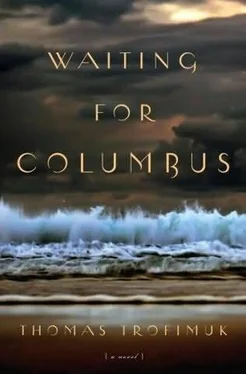Darkness falls and a thick mist eddies around the ships, but every now and then they can see the tops of trees teasing in the dim light.
In the lead ship, a ship called the Isabella, there is a man writing in his journal. He is writing about how many days they had been at sea. “We have been at sea for,” he writes, but the pen stops and the ink blotches the paper. He tries it again. “We have been at sea for…”
But surely this is important, he thinks. We’ve been at sea for how many days? Why don’t I know! How can I not know? I am the captain of this venture!
“Boy,” he snaps. The captain’s boy, Alphonso, approaches the desk. He has been in the corner polishing the breastplate Columbus will wear in the morning when he steps ashore in India, or Japan, or wherever this place is.
“Yes, sir,” the boy says slowly.
“I have a question for you. It is a question to which you should have an answer.”
“I will do my best, my captain.” Alphonso is not afraid of Columbus but he is aware of his volatile temperament. The captain sounds grumpy right now so caution is warranted.
“How many days have we been at sea?”
Alphonso knows this number. Every one of the crew knows the number. It is the most important number they have. It is more important than birthdays or years of age. But because it is so important, Alphonso thinks Columbus is testing him-testing his intelligence. It’s a trick question and so requires a careful answer. “We have been at sea since we left from port,” he says, smiling.
Columbus sighs. “Yes, that is true. And that translates to how many days, exactly?”
“As many days as it took us to make this glorious journey,” Alphonso says. Columbus frowns. Alphonso notices this shift, so he decides to lay on the God-and-country routine in order to protect himself. “This journey that was inspired by God and completed in God’s name and was performed in the name of our king and queen.” He’s more than a little wary now. Columbus is glaring at him.
Columbus sighs more heavily. “Yes, yes, yes. God, God, and more God. King and queen. Queens and kings. But how many days, exactly? The number. The number, Alphonso!”
“Ten?” he says timidly.
“Do you know how to count?”
“For the most part, yes.”
They both turn to look toward the door as they hear steps down the inner corridor. Someone knocks heavily. Three quick, light knocks followed by a clunk.
“Come in, Bartholomew,” Columbus says.
The door creaks open and Bartholomew enters. He is smiling, beaming with joy. One would be hard-pressed to see any resemblance in these brothers. Bartholomew is wider in his face with a thick, black beard, and his eyes are dark and set farther apart than Columbus ’s. His voice booms, where his brother’s voice commands. “In the morning you will finish what you started,” Bartholomew says. “Those dullards in the universities will shake their heads in wonder and awe. They will have to bow down to you, Christopher! You will be more famous than kings and queens. In the morning we will meet with the rulers of India or of Japan, and we will let them know that Spain is open for business from across the ocean!”
He produces a bottle of wine from his robes and holds it up. “I think we deserve a drink, my brother. It’s been a long, hard journey. I have been saving this.”
“Alphonso,” Columbus says. “Glasses.” Alphonso makes his escape toward the cabinet in which glasses are kept. “Nothing is finished, my brother, until we get back to Spain and prove we’ve been here. By the way, Bartholomew, what is the official count on the number of days we have been at sea?”
“The official count? There is no official count. That would mean there is also an unofficial count. There is only one count and you know-Are you all right? Are you feeling ill?”
“A little weary, perhaps.”
An uncomfortable silence grows between them. Columbus dearly wants someone to tell him the number of days they’ve been at sea, and Bartholomew wonders about his brother’s mental well-being. Alphonso-who doesn’t want any more trick questions-avoids eye contact and goes back to his polishing.
Bartholomew pours the wine and raises his glass. “Well, to the new route and the man who found it.”
“To those who unwaveringly believed and followed,” Columbus says. “And to God who blesses us at every turn. And to the king and queen of Spain.”
They down their wine. Bartholomew pours again.
“To the man who first spotted landfall after our long journey.”
“To me, again,” Columbus says. “It was I who pointed to land. I did the pointing. You have to point or it doesn’t count.”
“Wouldn’t actually seeing land be as important?”
“And how do you signify to those around you that you have seen? You point! I pointed.”
Columbus spends the rest of the evening alone in his quarters reading over his journal entries, which turn out to be a long, run-together diatribe on everything from the weather to women and the colors of clouds. It’s undated, unnumbered, and holds no clues as to how long it took them to arrive.
In the morning the mist burns off quickly, and they can see they are very close to a spectacular city nestled between two mountains. What fortune to have anchored so close to a city! The dock is lined with thousands of people. Red and silver and gold banners fly from the domes and spirals.
Columbus stands on the deck and looks across the harbor. There is a small boat in the water waiting for him. Bartholomew is on board. They are flying the Spanish flag. They also have red banners. The sun is shining. The sun is very bright. It hits the water and splashes in his eyes. He raises a hand as a shield.
On the dock, Columbus prepares to walk on a carpet of red flower petals toward his destiny. This is the moment he has been moving toward his entire life. There at the end of the square is the emperor, or the king, of this place. Red flower petals seem to fall from the sky. Columbus is presented with gold and silver, frankincense and myrrh. Then he is bowing a greeting to the emperor. “Your Majesty,” he says. “It’s very bright here. The sun is very bright. In fact, it’s almost too bright.” Yet I’m cold, he thinks. The breeze is chill. You would think with all this blasted sun that it would be warmer. It’s so bright. But it’s cold. I’m cold…
“ Columbus!”
He hears a frantic voice. “Yes, Your Majesty.”
“ Columbus! Christopher, wake up!”
“Wake up?”
“Yes, wake up!”
Columbus sits up in the bed and looks around the room. The sun is streaming through open windows. He is naked on top of the blankets and he has goose bumps on his arms. The sun has not yet warmed the night chill out of the morning. Through the window is a view of the ocean, but Columbus can’t see anything except that it is very bright. Beatriz is frowning at him from across the room. It takes a few minutes for him to see colors. Her robe is wrapped tightly around her body-a pink, protective armor. Her arms are folded across her chest.
“You were dreaming-speaking in your sleep,” she says.
“Mmmmm,” he grunts.
“You were dreaming about her again, weren’t you?” Her words are pinpricks.
There is no right answer to a question like this from Beatriz. Columbus has been down this road many times. He could explain it was just a dream and the things that happen in dreams cannot be controlled, but he’s not sure that’s true. Even though he was not dreaming of any women, he’s inclined to try and rationalize dreams in general. By saying our dreams cannot be controlled, however, he is also saying that he is guilty of dreaming about the woman in question. He could just deny it-speak the truth. But then she will likely not believe him.
Читать дальше











